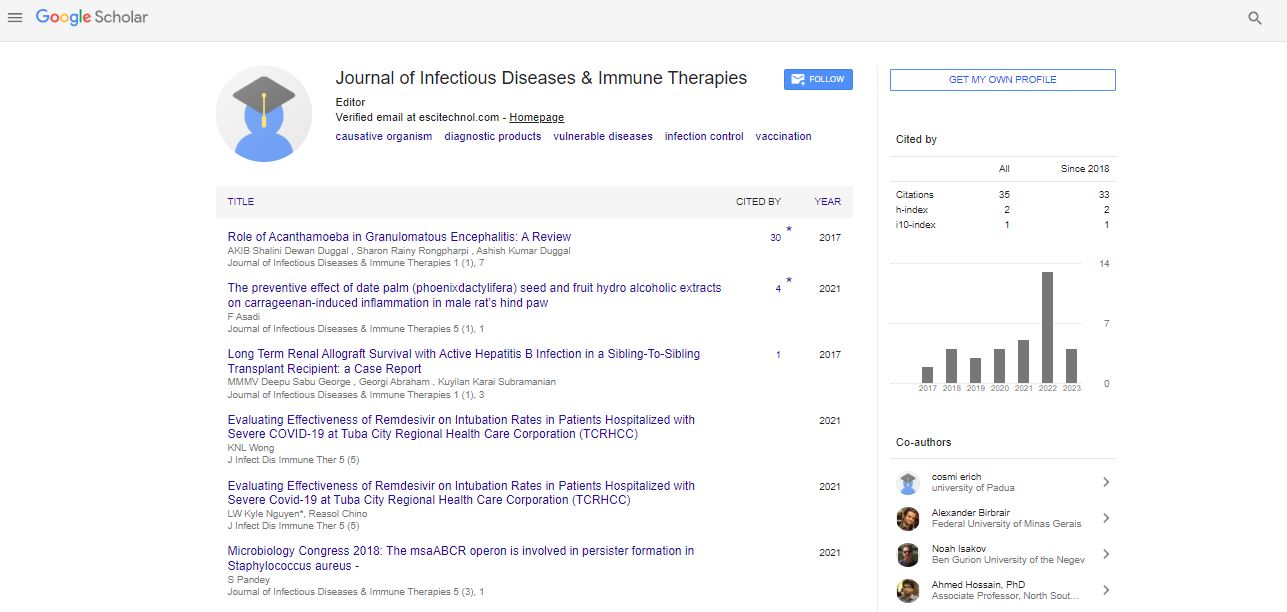Commentary, J Infect Dis Immune Ther Vol: 5 Issue: 5
A Commentary on Preliminaries of Chronic Conditions in Humans
Abidugun Azi*
Department of Medical Science, Elizade University, Ondo, Nigeria
*Corresponding Author:
Abidugun Azi, Department of Medical Science
Elizade University, Ondo, Nigeria
E-mail: aziabi@gun.in.com
Received: August 13, 2021; Accepted: August 27, 2021; Published: September 03, 2021
Citation: Azi A (2021) A Commentary on Preliminaries of Chronic Conditions in Humans. J Infect Dis Immune Ther 5:5.
Keywords: Urinary Tract Infections, Lyme disease, autoimmune diseases, genetic disorders
Description
A chronic condition or disease is a human health condition or disease that has long-term or persistent effects, or a disease that develops over time. Chronic diseases are those that have a course that lasts longer than three months. Common chronic diseases include arthritis, asthma, cancer, chronic obstructive pulmonary disease, diabetes, Lyme disease, autoimmune diseases, genetic disorders, and some viral diseases such as hepatitis C and acquired immunodeficiency syndrome. A terminal illness is one that lasts the rest of one's life and eventually kills the person.
It is possible and not uncommon for the definition of an illness to change from terminal to chronic. In medicine, a chronic condition can be distinguished from an acute condition. Acute conditions typically affect only one part of the body and are treatable and very common. A chronic condition, on the other hand, typically affects multiple areas of the body, is not fully responsive to treatment, and persists for an extended period of time.
Chronic conditions may experience periods of remission or relapse in which the disease temporarily disappears or reappears. Periods of remission and relapse are frequently discussed when discussing substance abuse disorders, which some consider to be chronic conditions. A growing body of evidence suggests that prevention is effective in reducing the impact of chronic conditions; specifically, early detection leads to less severe outcomes. Clinical preventive services include screening for disease or predisposition to disease, counseling, and immunization against infectious agents. Despite their effectiveness, preventive services are typically used at a lower rate than traditional medical services. Contrary to their obvious cost in terms of time and money, the benefits of preventive services are not directly perceived by patients because their effects are long-term or may be greater for society as a whole than for individuals. Chronic conditions are commonly used to describe a wide range of healthrelated states in the human body, such as syndromes, physical impairments, disabilities, and diseases. Epidemiologists are interested in chronic conditions because they contribute to disease, disability, and diminished physical and/or mental capacity.
High blood pressure, or hypertension, is thought to be not only a chronic condition, but also to be linked to diseases such as heart disease or stroke. Furthermore, some socioeconomic factors may be classified as chronic conditions due to their ability to cause disability in daily life. The treatment is aimed at addressing the underlying cause. If your doctor is unable to pinpoint the source of your symptoms, one of the following treatments may be beneficial: A longterm, low-dose antibiotic that can be used for up to two years. Intermittent or self-directed antibiotic therapy, such as taking an antibiotic after intercourse or starting a course of antibiotics prescribed by your doctor.
At the first indication of Urinary Tract Infections (UTI) some of the preventive measures are as follows: Drink plenty of liquids, especially water, to aid in bacteria removal. Urinate frequently, especially if you have a strong urge to do so. Wipe from front to back after urinating or having a bowel movement. Take a shower instead of bathing. Every day, gently wash the skin around your vagina and anus with a mild soap and plenty of water. Use methods of birth control other than a diaphragm and spermicides. Empty your bladder as soon as possible after intercourse. Avoid using deodorant sprays in the genital area.
 Spanish
Spanish  Chinese
Chinese  Russian
Russian  German
German  French
French  Japanese
Japanese  Portuguese
Portuguese  Hindi
Hindi 